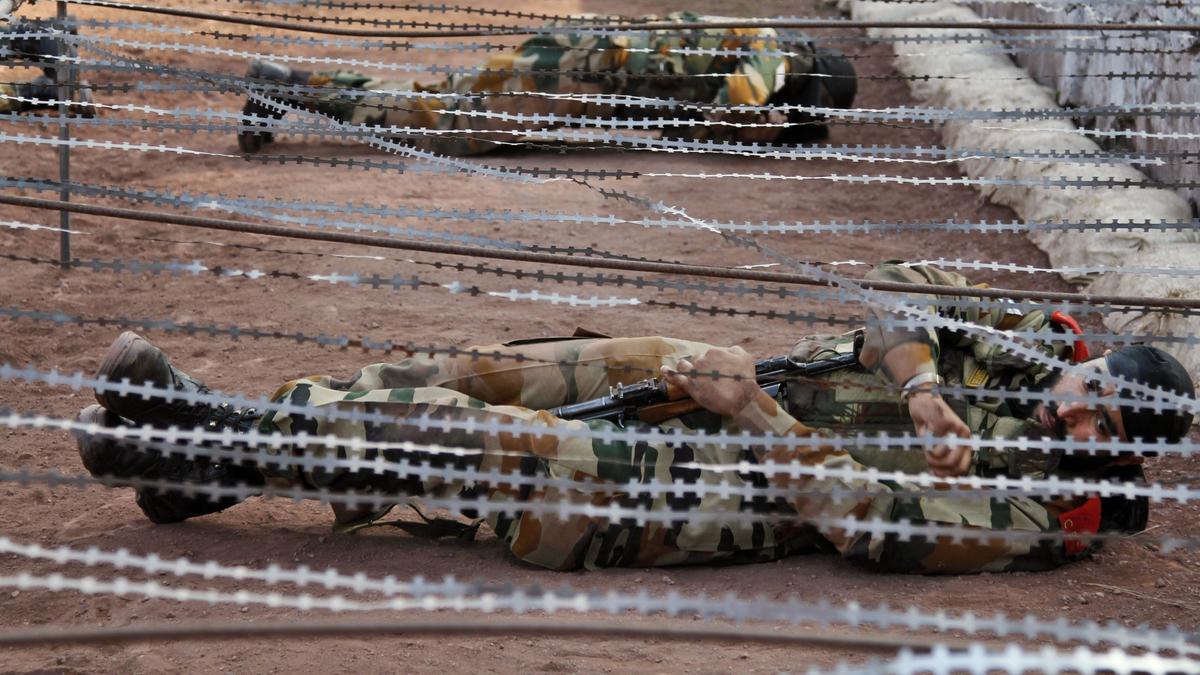
‘Why should the government not be flexible and forthcoming in implementing the rules for the benefit of all defence and security personnel?’
| Photo Credit: AP
It was with a sense of relief that one read about the Supreme Court of India taking up, suo motu following a media report, the case of cadets who have been boarded out of military academies after sustaining severe injuries and disabilities during their training. It has indeed been a travesty of justice that the special needs and requirements of young boys who came forward to serve the nation, and who sustained severe and debilitating injuries, were not fully catered to by the state till now. The Court may like to dig deeper in this issue.
In cases that involve monetary grants and compensation, there is always a conflict between the understanding of the organisation (read bureaucracy) of the lifelong consequences of serious medical infirmities and the reality that extant rules cannot cover all variations of human misfortune sustained in the line of military duty. The two virtues that are needed are flexibility and empathy. Here are two examples that would suffice.
The case of a mother-to-be
In 1989, this writer was a member of the committee that was in charge of the paperwork of an Indian Air Force (IAF) pilot who had died in a flying accident. His wife was expectant that time. According to the rules in force, the family pension for a widow with a living child was almost double that for a lady who did not have children. The rule book was silent on enhanced pension for a widow who was expectant and who would have the child later, and would, thus, require additional financial support within a few months. We spoke to everyone who mattered. Though everyone understood the unique issue, the answer we always got was that “rules are rules.” We were asked ‘to put up a case’ to the government for special consideration for the lady. But why should this be a special case? Why should it not be a general rule for any such misfortune? In the event, we did just that and the rules were amended. However, it still took a few years for the change to happen.
When a Governor acted
Two decades ago, an IAF Cheetah helicopter crashed in the Siachen Glacier. Those who have served on the Glacier will know the extreme dangers that are omnipresent in operations at an altitude of 20,000 feet. Unfortunately, one of the pilots died while the other pilot sustained severe head injuries which would have led to his invalidation from service. The family would have suffered severe hardships had it been left to fend for itself outside the cocoon of the IAF. The Commodore Commandant of the helicopter unit contacted the Governor of Chhattisgarh, the State the pilot was from, and the officer’s father met him to request that his son be granted a few years of extension till he got better. The Governor, Shekhar Dutt, who had served in the Indian Army and was a former Defence Secretary, responded with gusto and contacted the then Defence Minister, A.K. Antony (2006-14). Mr. Antony ensured the pilot’s extension. The pilot got another extension during the tenure of a later Defence Minister, Manohar Parrikar (2014-17). The Government must be lauded for doing its duty to a worthy combatant.
All this raises a series of serious questions. What would have happened had the stars not aligned the way they did? What if the Governor had not been a former serviceman who understood the dangers involved in air operations in a combat zone and went out of his way to help? Why should the government not be flexible and forthcoming in implementing the rules for the benefit of all defence and security personnel who put themselves in harm’s way to ensure India’s security — and not just in selected cases?
An attitude that must change
These are relevant questions because within 10 days of the media article highlighting the travails of the disabled cadets and the Supreme Court having taken suo motu notice, the government, on its own volition, acted. It granted these cadets medical benefits that are on a par with benefits given to ex-servicemen.
The cold fact is that over the years, there have been a number of media reports highlighting the plight of injured and disabled cadets and their difficulties that their families face. Yet, the bureaucracy has remained unmoved. The bureaucracy needs to answer tough questions by the higher judiciary about a heartless attitude.
The bureaucracy also needs to be made aware of the ‘George Fernandes solution’ when it was procrastinating on the purchase of snow scooters. George Fernandes, the then Defence Minister (1998-2001) sent the bureaucrats to Siachen to make them understand why the jawans needed the snow scooters there.
The bureaucracy should also have a look at Chanakya’s timeless quote on a soldier’s dues (paraphrased here so that the medical needs of soldiers are addressed with empathy)— ‘the day the soldier has to demand his dues will be a sad day for Magadha, for then, on that day, you will have lost all moral sanction to be King”.
It is time for the ‘King’ to act now — in full measure.
Air Vice Marshal Manmohan Bahadur (retired) is former Additional Director General, Centre for Air Power Studies
Published – September 03, 2025 12:08 am IST
